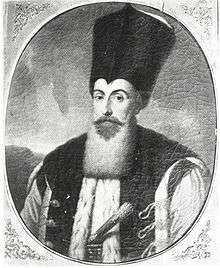John Caradja

John Caradja or John George Caradja (Greek: Ἰωάννης Γεώργιος Καρατζάς, Ioannis Georgios Karatzas; Romanian: Ioan Gheorghe Caragea; French: Jean Georges Caradja; 1754, Constantinople – 1844, Athens) was a Phanariote Prince of Wallachia, who reigned between 1812 and 1818. He became famous due to the code of law known as the Legiuirea Caragea ("Caragea's Law" or "Caradja's Law"), which was the first modern code of the Danubian Principalities, but also because of the effective measures taken during the bubonic plague outbreak of 1813. The epidemic became commonly known as Caragea's plague.
A member of the Caradja family, he was related to the Mavrocordatos. His nephew, Prince Alexander Mavrocordatos, was Court Secretary in Bucharest under his rule. Together with his uncle, Alexander Mavrocordatos went into exile to the Italian Peninsula, via the Austrian Empire (1818).
Biography
Caradja was named Prince by the Ottoman authorities in 1812, under the rule of Sultan Mahmud II. According to the report of the Imperial French Ambassador to Constantinople, in order to become hospodar, Caradja had to pay 8,000 bags of gold (4 million lei).[1] During the first night he spent in Bucharest, the princely residence of Dealul Spirii (Curtea Nouă) burnt down.
Soon after, one of the men from his staff, who had come with him from Istanbul, died of bubonic plague, and Wallachia was struck by one of the worst epidemics in its history (see Caragea's plague). An estimated 70,000 people died of the plague in the entire country, with some 40,000 victims in Bucharest. Caradja fled the city and settled at the nearby Cotroceni Monastery.
In 1813 and 1814, Caradja supported his third cousin, Costache, the son of the former reigning Prince Nicolae Caradja (reigned 1782-1783), in controlling the city of Ploieşti, initially as a gift for Costache's wedding with Princess Raluca Moruzi, whose family once owned the land on which the city was built. The inhabitants of Ploieşti revolted, and the ispravnics were afraid to take any measure. After another decree which confirmed the previous one, the shopkeepers of Ploieşti decided to close all the shops in Ploieşti as a protest, and on 14 April of the same year, every activity of the city stopped. Caradja sent to prison without trial the heads of the rebellion, but he revoked the order upon learning that one of them was a Russian sudit.[2]
In June 1816, a conspiracy against Caradja and the members of his Divan was averted and the heads of the revolutionary movement (including two Austrian sudiţi) were executed. The boyars suspected of being associated with the plotters (among them Constantin Filipescu, Vornic Constantin Bălăceanu and Great Logofăt Grigore Ghica) were exiled to their estates.[3]
In 1818, Caradja issued his code of law, which established high feudal taxes for the peasants, but also modernized the jurisprudence. Caradja managed to gather large amounts of money, by means of direct taxes (for peasants and guilds), and the selling of boyar titles, mines and custom tariffs. The incomes of the prince grew from 1.5 million lei to 3.7 million lei.[4]

Fearing an Ottoman intervention, on 29 September 1818 Caradja fled the country. In the morning of that day, he participated in a religious ceremony dedicated to the late Radu Golescu; after lunch, he pretended to go with the whole family for a walk outside the city. After four hours, a messenger sent by Caradja announced to the boyars that he had left the country and had named an interim căimăcămie of Ban Grigore Brâncovenu, Vornic Barbu Văcărescu, Vistier Grigore Ghica and Logofăt Samurcaş.[5]
Caradja left with a guard made out of 300 Albanian mercenaries (arnăuţi), who took him to Braşov, in Austrian-ruled Transylvania. Along the way, all bridges from Bucharest to Braşov were destroyed, so that no one could follow him. Caradja had prepared his run for some time, sending large amounts of money to Switzerland, Russia and England.[5]
A few weeks later, he left for Pisa, in the Grand Duchy of Tuscany, and afterwards settled in Athens where he lived for the rest of his life out of the wealth accumulated in Wallachia. He donated large amounts of money to the cause of Filiki Eteria and the Greek revolutionary movement, and large properties to the city of Athens.[4]
Princess Ralu Caragea (1799–1870) was the daughter of John Caragea. She convinced her father to found a royal dramatic society, and founded the first court theatre.
Caradja's hot air balloon
In the Summer of 1818, at the request of Caradja's daughter, Princess Ralu, a hot air balloon was flown off Dealul Spirii in Bucharest with no passenger on board. The balloon, popularly known as Caradja's Bladder (Bășica lui Caragea), was made by German craftsmen from Brasov, had approximately eight meters in diameter and utilized a barrel of alcohol placed in the nacelle as a source of heat. That was the first recorded hot air balloon launch in the Romanian Principalities.[6]
Notes
References
- Ştefan Ionescu, Bucureştii în vremea fanarioţilor ("Bucharest in the time of the Phanariotes"), Editura Dacia, Cluj-Napoca, 1974
| Preceded by Demetrios Mourouzis |
Grand Dragoman of the Porte 1812 |
Succeeded by Iakovos Argyropoulos |
| Preceded by Constantine Ypsilantis |
Prince of Wallachia 1812–1818 |
Succeeded by Alexandros Soutzos |